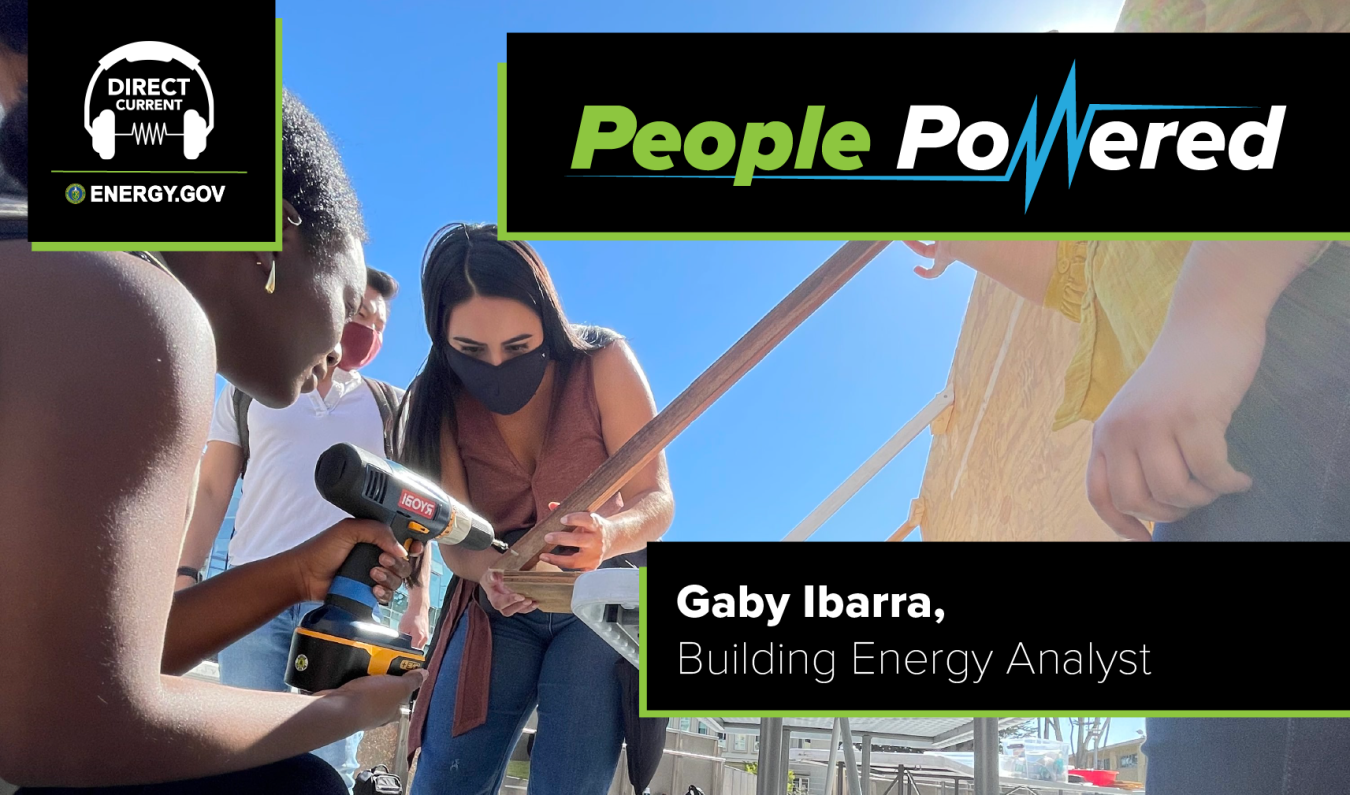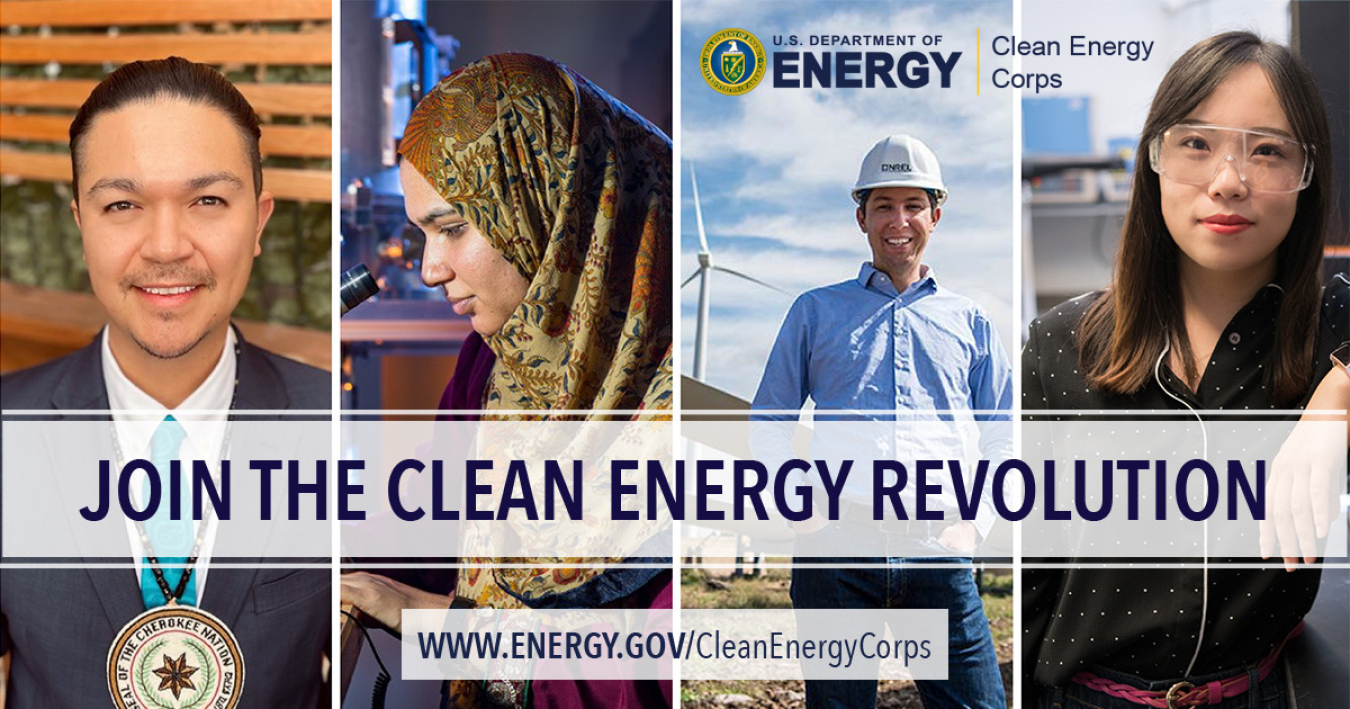
People Powered
Direct Current - An Energy.gov Podcast presents People Powered, a series that brings you real stories of the folks getting their paychecks in the clean energy sector. There are millions of good-paying jobs in energy, and you’ll get a chance to meet some of the people who have jumped into these fast-growing careers.

Meet Gaby Ibarra
Gaby Ibarra is a building energy analyst for BlocPower in New York City, where she works on replacing the heating and cooling systems in old buildings with healthier, more efficient electric heat pumps.
Gaby just started her career in building energy efficiency, and in this episode she shares the story of how she found her way into the field — from her childhood as a daughter of Mexican immigrants to her education as a first-generation college student, and the understanding of environmental injustice that shaped her career trajectory.
Build Yourself a Career in Buildings
Did you know that over 2 million people work in the energy efficiency sector across the United States? Many of America’s 130 million buildings need an upgrade to meet our energy goals in an environmentally responsible way, and we need talented architects, engineers, builders, contractors, facility managers and more to make it happen.
The Department of Energy's Building Technologies Office's interactie Green Buildings Career Map can help you chart a course into the building energy workforce! Find out where the jobs are, what education you need, and how you can move from one corner of the buildings sector to another. Learn how the career map works and chart your buildings career today.

NOW HIRING: The Clean Energy Corps!
Have you heard about the Clean Energy Corps? It’s your opportunity to make a huge difference and lower energy prices for Americans while creating good-paying jobs in the energy sector. For first-time job seekers, executives, and everyone in between, the Clean Energy Corps is your gateway to an impactful career.

Listen to More Episodes
Heard our other People Powered episodes yet? Hear from Kaly Moore, construction manager for a solar company in Washington, D.C., about why she loves working in solar, how it has helped stabilize and revolutionize her life, and how it feels to make a positive impact on her community every day.
Or listen to Michael Flores, a traveling wind technician who crisscrosses the country with his dog, Riley, share what it's like climbing 300-foot wind turbines and keeping their massive machinery in working order.
Subscribe to Direct Current on Apple Podcasts to catch all of our episodes!
(UPBEAT MUSIC WITH GUITAR AND DRUMS PLAYS)
GABY IBARRA: After learning about environmental injustice and learning specifically how it has impacted my community, it really struck a chord with me, and I knew that I wanted to work in this field.
(MUSIC CONTINUES)
GABY IBARRA: Everyone in this career and sector is so, so sweet and so willing to learn.
(MUSIC CONTINUES)
GABY IBARRA: Something I was really nervous about at first, is the pay. Because first-gen, you know, that's something that you really worry about. Like, let's just get the highest-paying job, and I was proven wrong.
MATT DOZIER: Welcome to another episode of Direct Current’s “People Powered” series, where we bring you real stories of the people powering our clean energy economy. I’m your host, Matt Dozier. Today, I want to introduce you to Gaby Ibarra — she’s a first-generation college graduate and daughter of Mexican immigrants who recently moved to New York City to start her career. She’s working for a startup that modernizes old buildings, replacing their outdated heating and cooling systems with healthier, more efficient electric ones. Coming up, we’ll hear from Gaby about how she found her way into this field, and what it means to her to help low- and middle-income neighbors with their energy bills while cutting down on carbon emissions. Stay tuned!
(MUSIC FADES OUT)
(DIRECT CURRENT THEME PLAYS)
GABY IBARRA: My name is Gaby Ibarra, I'm currently in Brooklyn, New York, and my job title is I'm a building energy analyst at BlocPower.
MATT DOZIER: So, tell us a little about yourself.
GABY IBARRA: So, yeah, I'm a 24-year-old Latina. I'm actually from Los Angeles, California. I came to Brooklyn for this amazing job. My family is from Mexico, and it's something I carry very proudly on my shoulder. I went to college being the first-gen in my family, which is something also I'm really proud of. I went to USC, which really has close family ties to me because my mom actually worked there her whole life. She's been working there since before I was born, so I felt like I was meant...
MATT DOZIER: Oh, wow.
GABY IBARRA: Yeah. I was meant to go there. And during my time there, I studied to be a chemical engineer, and I had an emphasis in environmental engineering. So that's kind of how I started to get sprinkled into this. I graduated in 2020, now currently pursuing my masters at the University of San Francisco in energy systems management, and yeah, now I'm here working at BlocPower.
MATT DOZIER: What does a building energy analyst do? How would you explain your work to your parents, or a friend?
GABY IBARRA: Yeah. Being a first-gen college student, sometimes that's a lot of questions I get asked, like, "What do you do?" You know? So what I tell my family and friends is that we electrify homes here in New York, and we focus specifically on low- and medium-income households. So what does that look like? We replace their fossil-burning heating systems and cooling systems with heat pumps. So now it can be fully run on electricity, and that can move us towards our zero net energy goals as a society.
MATT DOZIER: Awesome. So what does a typical day on the job look like for you?
GABY IBARRA: Yeah. As part of our engineering team, I work on different projects and coming up with the design and feasibility of these projects. So what that looks like is working with other teams such as our business development teams, understanding what the scope of work is for these buildings. The think you learn fast when you start working in the building sector is every building is very unique. And you start becoming a little detective, so you really start understanding what this building is, what are the needs of the building and their occupants, and how we can get them towards being fully electric.
MATT DOZIER: Tell me a little more about that process. What's it like being a "detective" and seeking out the different ways that you can help electrify the home — are you in single-family homes, apartment complexes, that sort of thing? Is it a variety?
GABY IBARRA: We work on a variety of homes, from single-family to multi-family to duplex complexes, especially here in New York. So what that looks like is, we have to calculate what the building heating and cooling load is, so we have to understand how much the house needs to be comfortable for people to live in. And some of these buildings are very, very old — so 1910s, 1800s even. So you have to understand how the building was built, what were the materials incorporated, to understand how bad it is to keep heat inside, essentially. So if a home is pretty old, then you can imagine that it demands more heat, because the heat just wants to leave. So you have to understand, you know, how also the occupants are using it. Like you were saying, is it a single family or is it like a huge apartment building, right? Where you keep coming in and out, and the door keeps opening.
MATT DOZIER: Right.
GABY IBARRA: So we work with the clients to understand what that looks like, we go into the buildings, take pictures, take pictures of what they currently have for their heating systems and their A/Cs. Do they have window units, things like that? So we are able to paint a better picture of understanding what their heating load is going to be needed, to now design what we want for them.
MATT DOZIER: What does it look like when you're taking the existing system and doing those calculations to figure out what the new system needs to be? You said it's always different from building to building, you know, how does it change from one to the next?
GABY IBARRA: Yeah, so, I think... OK, this gets complicated really quick. (LAUGHS) Um, but we focus really on just changing the heating system that they currently have, when in reality, in order for a home to be the best efficiency, it takes so much more than that in creating the insulation, sealing the windows, things like that. And we do obviously include that a lot in our projects, but those calculations are the hard parts to know because some buildings are so old that people aren't aware of what they're even living in, right? They're like, "I don't know what's in my walls, I don't know if I have insulation or not." So, (LAUGHS) that's always the harder part. Yeah.
MATT DOZIER: Do you go in — I mean, how much time do you spend going into the buildings and trying to suss that kind of stuff out?
GABY IBARRA: Yeah. So we have a great construction team that goes in, and they're the ones that take pictures of everything, get us the full scoop of what we're looking at. And New York has also great databases where we can find these records of these buildings, of understanding what they've gone through. And that's something that's really unique about New York, and why BlocPower has started here because we have this data and it helps us build off of our projects.
(UPBEAT MUSIC WITH GUITAR AND MARIMBA PLAYS)
MATT DOZIER: Coming up, a change of perspective sets Gaby on a new career path.
CHARISMA TROIANO: Hey, did you know that over 2 million people work in the energy efficiency sector across the United States? Many of America’s 130 million buildings need an upgrade to meet our energy needs in an environmentally responsible way. We need talented architects, engineers, builders, contractors, facility managers and so much more to make this happen. Would you like to join them? The Building Technologies Office’s Green Buildings Career Map show you how. At greenbuildingscareermap.org, you can chart your own course in the buildings sector. Find out what jobs there are, what education you need, and how you can move from one corner of the buildings sector to another. Visit https://greenbuildingscareermap.org/ to chart your buildings career today.
(MUSIC ENDS)
MATT DOZIER: How did you get into this line of work?
GABY IBARRA: Yeah. So I was studying chemical engineering, you know, as a first-gen you kind of just go into college and you're just really lost and not understanding what majors even are. You kind of only go to find a job because that's what everyone tells you. So I love chemistry and I love math, and I was like, "Oh, this checks out." But closer to my senior year, after learning about environmental injustice and learning specifically how it has impacted my community, it really struck a chord with me, and I knew that I wanted to work in this field, especially in engineering, because usually you don't see women or people of color, I think, in engineering. A lot of times people don't think that has anything to do with equity or environmental justice, when I think it's quite the opposite, right? We are literally building the societies and things around that affect people. So I knew I wanted to speak for these communities and make sure that all voices are heard equally, and that we are asking these questions when making our designs and planning. So I learned about it at school, and I was like, this is what I'm going to do, and now I've decided to get my masters to learn more about the energy systems because that was something I felt I was definitely lacking in. And now I'm learning about the history of our grid and how utilities work, and what the future looks like. And I want to keep making sure that we're asking the questions of, "Who is being asked what to do next?" And making sure that all these voices are included and acknowledged.
MATT DOZIER: So, you have an engineering background. Do you think that that's generally the level of education that somebody needs to get into a similar role as what you're doing?
GABY IBARRA: I think — I don't want to say so, but I'm not sure. (LAUGHS) If I'm being completely honest. I believe that if you maybe go to trade school and also become an electrician, I think you can also take up a role like this. I don't think it's specifically very narrow to "you have to have an engineering degree." But of course, a lot of the things that I did learn from school are very helpful to this now.
MATT DOZIER: Was this your first job out of college?
GABY IBARRA: So, I did a fellowship last year with ClimateCorps AmeriCorps, and that was about a year fellowship, and then I came here to BlocPower
MATT DOZIER: What do you like the most about your job?
GABY IBARRA: I think it's the work and the people. The people in my work are just so passionate about the climate crisis, and I just appreciate the passion that they also have of being willing to continue to learn, which I don't think is necessarily true for every field of work. So that is something I really enjoy about my work, and then of course the work that we do — knowing that we're working toward ending the climate crisis is really powerful.
MATT DOZIER: Yeah, for sure. What kind of impact would you say that this job, this career has made on your life?
GABY IBARRA: I mean physically, I'm here in New York now, (LAUGHS) so that's like a huge impact it made on my life. But also I really think now I understand how complex solving the climate crisis can be, and how many different moving parts there are to it. And that is something I definitely understand now, as well as continuously learning how we need to work with communities instead of just coming in and acting like we know what the best is, instead of working with the communities that we're in, right? I don't know if that makes any sense.
MATT DOZIER: Yeah, instead of dictating what needs to happen, or what should happen.
GABY IBARRA: Exactly.
MATT DOZIER: Do you see this as, I don't know if lifelong is necessarily the best wording, but do you see this as a career for the long term?
GABY IBARRA: Yes. Definitely this is something I want to continue doing. I'm still pretty young, I think (LAUGHS), so I'm not sure if I specifically want to stay in buildings, but I know I want to dedicate my career to solving the climate crisis. And going back to what I said, I really want to make sure that all communities are really included in this transition, and making sure that their voices are acknowledged.
(UPBEAT MUSIC WITH GUITAR AND MARIMBA PLAYS)
JIGAR SHAH: It’s time for you to come create solutions that save the planet. I’m Jigar Shah, Director of the U.S. Department of Energy’s Loan Programs Office, where we finance large-scale, game changing energy companies and projects. As someone who’s new to federal service after a career in the private sector, I can share from personal experience what a great transition it has been to work with this group of professional dedicated to the mission of DOE. Through the Clean Energy Corps, DOE is hiring across the country, in a direct-hire (aka faster!) process to join the federal service. If you want to do meaningful work and like what you do with solid job benefits, like a path to a pension, strong retirement match, paid parental leave, generous health care contributions, and much more, please consider joining us. Check out energy.gov/careers now and drop in your resume. It’s the chance of a lifetime to make an impact for generations to come. We’re hiring positions across the country, across career categories, across expertise levels — you want to work in a diverse, fast-paced job that takes on the climate crisis. Apply today!
(MUSIC ENDS)
MATT DOZIER: Thinking of it, then, as kind of a career path, how do you see your future trajectory? Do you feel good? So-so about the prospects of advancements, pay, benefits, things like that?
GABY IBARRA: Yeah, definitely. That's a great question, because it was something I was really nervous about at first, when I decided to go into working in the climate crisis, is — is the pay. Because you know, again, I was saying, first-gen, you know? That's something that you really worry about. Like, let's just get the highest-paying job and let's keep going and marching along — but I was proven wrong. I have talked to multiple people in this career, and they have all told me there is security in these jobs, and there is good pay, and it's not something you necessarily have to worry about. Of course I understand that I do have an engineering degree, and I do want to acknowledge that, but I still believe that there is a lot of great jobs out there with a lot of security and pay and upward mobility, like you were saying.
MATT DOZIER: Right. So, doing something that's beneficial to the planet, to society, is not necessarily mutually exclusive with actually making a decent living.
GABY IBARRA: Yes. I agree with that statement 100 percent.
MATT DOZIER: You've talked about this a little bit so far, but on the note of working in a field that's actively combating the climate crisis, how does it feel when you take a step back and think about the impact that the kind of work that you're doing can have on communities?
GABY IBARRA: It makes me feel so happy, so proud, and makes me want to keep going. You know? Yeah. It's a whole lot of feelings you can feel, and I understand that it's still a job at the end of the day. So sometimes you can get lost doing your work. When I'm doing a heating load calculation, I don't necessarily think, "Yes, I'm reducing emissions and now the world's going to be solved" — like, of course not, you know? So it is important, I think personally, for me to kind of step back and understand what the big picture of my career is, and of my job, and the company I work for. And that just makes me so proud to be a part of, and motivating, and it's something that I kind of try to push other people to continuously. I can't help it, you know? (LAUGHS)
MATT DOZIER: Right. You mentioned your roots in Los Angeles. Do you ever see yourself trying to go back and implement the skills, the work that you've done in New York and taking that back to L.A.?
GABY IBARRA: Yes, of course, constantly. (LAUGHS) You know, I'm still really early on in my career, and I'm trying to learn as much as possible from all these amazing people I have met here. And understanding how I can bring this back, exactly how you said, to my community. I'm from the San Fernando Valley, so that would be my dream is going back and making sure I can help us, in whatever way possible, you know?
MATT DOZIER: What advice would you have for somebody else who's interested in following a similar path or doing the kind of work that you're doing?
GABY IBARRA: Yeah, I would say go for it. (LAUGHS) Just do it. Start talking to as many people as possible. I understand that it's very overwhelming, the idea of networking used to scare me like crazy, but everyone in this career and sector is so, so sweet and so willing to learn, and it's, like, the most inclusive sector I have ever worked with. I mean — again, it's my first career, (LAUGHS) but you know, coming from chemical engineering, it's very inclusive compared to things like that. So I would say, please don't be afraid to reach out to people on LinkedIn, on Instagram, on any platform — go ahead and ask questions, because I know I'm willing to answer, and I know so many other people are willing to answer, too. Because that's our favorite thing, is to talk about our jobs and recruit as many people as possible. (LAUGHS)
MATT DOZIER: That's good advice. Gaby Ibarra, thank you so much for joining me today.
GABY IBARRA: Thank you so much for having me!
(SOFT AMBIENT ELECTRONIC MUSIC PLAYS)
MATT DOZIER: That’s all for this episode of Direct Current. We’ll have more energy efficiency content, including links to the Green Buildings Career Map and Clean Energy Corps, in our show notes at energy.gov/podcast. A huge thanks to my guest, Gaby Ibarra, for sharing her story. Thanks as well to Jigar Shah and Charisma Troiano for lending their voices to this episode. Stay tuned for more People Powered stories! Subscribe to Direct Current on Apple Podcasts, or wherever you get your podcasts, to hear the rest of the series. Direct Current is produced by me, Matt Dozier. Sarah Harman creates original artwork for all of our episodes. This is a production of the U.S. Department of Energy and published from our nation’s capital in Washington, D.C. Thanks for listening!
(MUSIC FADES OUT)